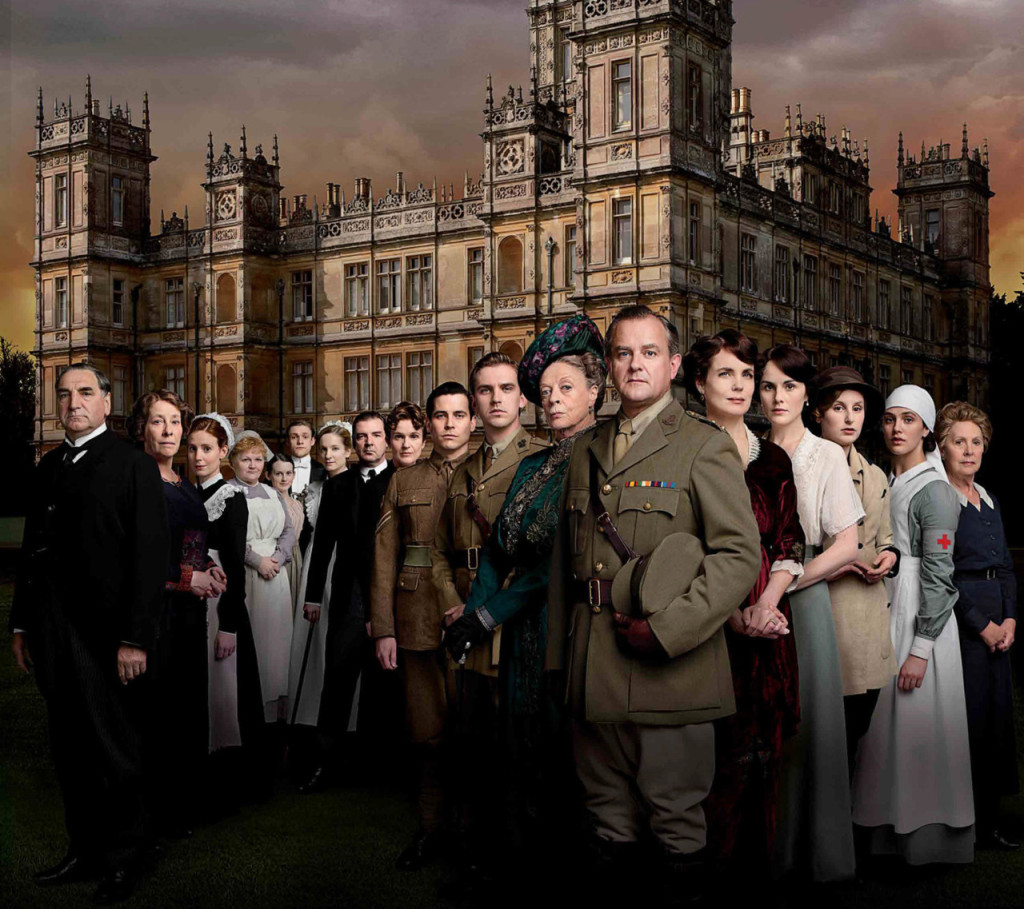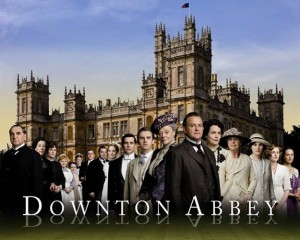
Chances are you’re caught up on the anachronisms of Downton Abbey, between Ben Zimmer’s Visual Thesaurus post, his talk with NPR, his post for Language Log that goes beyond the nitpickery, and Fritnancy’s post on the 1918 anachronism, contact. But what about the words and phrases the show has gotten right?
From obsolete medical terms to nautical sayings to phrases which may be common to Brits but are novel to these American ears, we’ve gathered them here, including a couple of terms that no one on Downton Abbey should be saying unless they own a time machine.
Spoilers may follow.
UPDATE: We corrected aerosyphilis to be erysipelas. Thanks to our readers for the helpful comments.
any port in a storm
Cora: “Is [Edith] really serious about [Sir Anthony]?”
Violet: “Any port in a storm.”
Episode 7, Season 1, November 7, 2010
Any port in a storm is an idiom that means “an unfavourable option which might well be avoided in good times but which nevertheless looks better than the alternatives at the current time.” The first record of the phrase is from 1749.
banns, the
Cora: “To live with him? Unmarried?”
Sybil: “I’ll live with his mother till the banns are read.”
Episode 6, Season 2, October 30, 2011
The banns, often referred to as the banns of marriage (attested from the 1540s) is “the proclamation of intended marriage in order that those who know of any impediment thereto may state it to the proper authorities.” The word comes from the Old English bannan, “to summon, command, proclaim,” and is no longer required for “a valid civil marriage in England, Scotland, or the United States.”
batman
Anna: “He was Lord Grantham’s batman when he was fighting the Boers.”
Episode 1, Season 1, September 26, 2010
A batman is “a British military officer’s orderly,” whose “duty is to take charge of the cooking utensils, etc., of the company.” The word first appeared in 1755, and comes from the late 14th century word for “pack-saddle,” bat. Bat in this sense comes from the Latin bastum, “stout staff,” with the sense of lifting up or offering support.
Blighty
O’Brien [to Thomas]: “What about your Blighty?”
Episode 1, Season 2, September 18, 2011
In this context, Blighty is short for blighty wound, “a minor wound. . .serious enough to take a soldier out of combat.” Blighty originally referred to “Great Britain, Britain, or England, especially as viewed from abroad,” and is a corruption of the Hindi vilāyatī, “foreign.” According to the Oxford Dictionary blog, Blighty was first recorded in print in 1915.
blub
Mary [to Matthew]: “Blub all you like. And then when Lavinia’s here, you can make plans.”
Episode 4, Season 2, October 9, 2011
Blub means to “to cry, whine, or blubber,” and originated in 1894. Presumably blub is short for blubber, which comes from the Middle English bluberen, “to bubble.” Blubber meaning “to cry, to overflow with weeping” is from the 15th century.
canvass
Sybil: “I want to do some canvassing. The by-election’s not far off.”
Episode 6, Season 1, October 31, 2010
To canvass means “to solicit or go about soliciting votes, interest, orders, subscriptions, or the like,” and originated in the 16th century. The word comes from canvas, “a fabric woven in small square meshes” (which comes from the Latin cannabis, “hemp”), with the idea that “to toss in a canvas sheet” can mean “to shake out, examine carefully,” which is perhaps connected with “shaking out” votes.
chivvy
Isobel [to Cora]: “It was [cousin Violet] who drew my attention to the plight of the refugees. I feel very guilty since I chivvied you, and now I’m jumping ship, but I can’t run Downton as well.”
Episode 5, Season 2, October 16, 2011
To chivvy means “to coerce, as by persistent request,” and originated in 1918. The word is an alternative of chevy, “to chase about or hunt from place to place; throw or pitch about; worry.” Chevy comes from chevy chase (not that Chevy Chase), “a running pursuit,” which probably comes from the 15th century The Ballad of Chevy Chase, which tells “the story of a large hunting party upon a parcel of hunting land (or chase) in the Cheviot Hills, hence the term, Chevy Chase.”
dole
Violet [to Mr. Travis]: “You cannot imagine we would allow you to prevent [William’s marriage from] happening in case his widow claimed her dole?”
Episode 4, Season 2, October 9, 2011
Dole is a chiefly British term referring to “the distribution by the government of relief payments to the unemployed,” as well as “a portion of money, food, or other things distributed in charity.” The word comes from Middle English dol, “part, share.” The phrase on the dole, “receiving financial assistance from a governmental agency, such as a welfare agency,” originated in the 1920s.
dressing gong
Cora: “Now I’m going up to the rest. Wake me at the dressing gong.”
Episode 2, Season 1, October 3, 2010
The dressing gong, according to David Durant’s Where Queen Elizabeth Slept and What the Butler Saw, was “an essentially Victorian feature of a large household,” and would be rung “one hour before dinner was to be served,” again “when dinner was served,” earlier for luncheon, “but never for breakfast.”
dropsy
Isobel: “Is the dropsy of the liver or the heart?”
Episode 2, Season 1, October 3, 2010
Dropsy is an obsolete medical term for “a morbid accumulation of watery liquid in any cavity of the body or in the tissues,” now known as edema. The word dropsy comes from the Greek hydrops, with hydro- meaning “water,” and -ops meaning “face.”
drudge
Mr. Bryant: “In the world as it, compare the two futures. The first as my heir, educated, privileged, rich. Able to do what he wants, to marry whom he likes. The second. . .as the nameless offshoot of a drudge.”
Episode 6, Season 2, October 30, 2011
A drudge is “one who toils, especially at servile or mechanical labor; one who labors hard in servile or uninteresting employments; a spiritless toiler.” The word is attested to the late 15th century and may be related to the Old English dreogan, “to work, suffer, endure.”
erysipelas
Isobel [to Mosely]: “Erysipelas is very hard to cure. We should be able to reduce the symptoms but that might be all we can do.”
Episode 4, Season 1, October 17, 2010
Erysipelas is “a disease characterized by a diffuse inflammation of the skin and subcutaneous areolar tissue.” The word comes from the Greek erysipelas, which may come from erythros, “red,” and pella, “skin.” The disease is also known as St. Anthony’s fire, “said to be so called,” according to the Online Etymology Dictionary, “from the tradition that those who sought his intercession recovered from that distemper during a fatal epidemic in 1089.”
fall like ninepins
Robert: “Good heavens, everyone’s falling like ninepins.”
Episode 6, Season 2, October 30, 2011
To fall like ninepins is a British idiom that means “to fall, break or be damaged in large numbers.” Ninepins is a game like bowling played with nine pins, and attested to the 1570s.
fighting fit
Anna: “Mrs. Patmore’s fighting fit again.”
Episode 7, Season 1, November 7, 2010
Fighting fit, which seems to have originated as a military term, means to be “very fit; in the peak of condition.” “As the pressure is brought to bear, there is coming a strain between the fighting-fit who are single and those who are married.” Recruiting at Home, Fielding Star, February 1916
guinea a minute
Carson: “You didn’t know [Mary] when she was a child, Mrs. Hughes. She was a guinea a minute then.”
Episode 6, Season 2, October 30, 2011
Guinea a minute means something or someone that is great fun, and worth a “guinea a minute.” A guinea was “a gold coin issued in England from 1663 to 1813 and worth one pound and one shilling.” “That day made a high festival for her, and, to use her own expressive phrase, ‘was worth a guinea a minute to her.'” Letters of Chauncey Wright, 1878
lead someone down the garden path
Daisy: “I feel I’ve led him up the garden path with all that nonsense.”
Episode 4, Season 2, October 9, 2011
To lead someone down the garden path means “to deceive, hoodwink,” and seems to attest to the early 1920s. This episode takes place in 1918, making this phrase a possible anachronism.
light the blue touchpaper
Violet [to Lavinia who is playing a gramophone]: “I’ll stand well clear when you light the blue touchpaper.”
Episode 6, Season 2, October 30, 2011
The full phrase is light the blue touchpaper and retire immediately or light the blue touchpaper and stand well clear. Touchpaper is “paper steeped in niter so that it catches fire from a spark and burns slowly, used for firing gunpowder and other explosives.”
The phrase is said when “doing something risky,” according to A Dictionary of Catch Phrases by Eric Partridge. Also according to Partridge the phrase didn’t gain popularity till the 1930s when the BBC radio show, Band Waggon, used it as a catchphrase. The episode takes place in 1919, signalling a possible anachronism.
like it or lump it
Robert: “And if his grace doesn’t like it, he can lump it.”
Episode 1, Season 1, September 26, 2010
The phrase like it or lump it means “to accept a situation whether one agrees with it or not.” The phrase attests to the early 1800s.
no names, no pack drill
Matthew: “I suppose [my mother is] driving cousin Cora mad.”
Mary: “No names, no pack drill.”
Episode 2, Season 2, September 25, 2011
According to World Wide Words, no names, no pack drill seems “to have been of First World War origin,” and means “that if nobody is named as being responsible, then nobody can be punished, the point being that in some situation or other it’s wisest not to name the person being discussed.” Pack-drill was “a military punishment in which the offender is compelled to walk up and down for a certain number of hours in full marching order, with arms, ammunition, knapsack, and overcoat,” and originated in the 19th century.
penny dreadful
Daisy [referring to the Titanic]: “All them people, freezing to death in the midnight icy water.”
O’Brien: “Oh, you sound like a penny dreadful.”
Episode 1, Season 1, September 26, 2010
A penny dreadful is “a cheap pulp novel produced in 19th century Britain,” and seems to have originated in 1870. It was also known as a penny horrible, penny awful, penny number, and penny blood.
posh
Branson [to Sybil]: “Flattered is a word that posh people use when they’re about to say no.”
Episode 1, Season 2, September 18, 2011
Posh means “smart and fashionable,” but also “snobbish, materialistic, prejudiced, under the illusion that they are better than everyone else,” especially in Scotland and North England.
The word attests to 1914. The origin is obscure. The Online Etymology Dictionary says there is “no evidence for the common derivation from an acronym of port outward, starboard home, supposedly the shipboard accommodations of wealthy British traveling to India on the P & O Lines (to keep their cabins out of the sun),” and that the word is more likely from the 1890 meaning of posh, “a dandy,” which comes from “thieves’ slang meaning ‘money’ (1830), originally ‘coin of small value, halfpenny,’ possibly from Romany posh ‘half.’”
shipshape and Bristol fashion
Mary: “Carson and I were just making sure that everything was shipshape and Bristol fashion.”
Episode 3, Season 1, October 10, 2010
Shipshape and Bristol fashion means “tidily tied down and secure.” The phrase seems to have started out as two separate phrases, shipshape which came about in the 17th century, and Bristol fashion in the 19th century. Bristol is an old English seaport.
sprat to catch a mackerel
Mrs. Patmore: “He knows this is just the sprat to catch the mackerel.”
Episode 6, Season 2, October 30, 2011
A sprat to catch a mackerel (sometimes throw out a sprat to catch a mackerel) refers to the “sacrifice [of] something of little value in the hope of gaining something better.” A sprat is “a small marine food fish,” while a mackerel is another kind of fish. The phrase dates from the 19th century.
start of the grouse
Violet: “We’ll give her till the start of the grouse.”
Episode 6, Season 1, October 31, 2010
The start of the grouse refers to the start of the grouse hunting season, also known as the Glorious Twelfth, usually used to refer to August 12th, and seems to date back to 1831.
stranger things happen at sea
William: “[My mother] hopes one day that I might be first footman, or even get to be – ”
Mary: “Carson had better watch out.”
William: “Stranger things happen at sea.”
Episode 6, Season 1, October 31, 2010
Stranger things happen at sea is an idiom that refers to a seemingly implausible event or outcome that may in fact be possible. The origin seems unknown, as far as we could find, although we did locate this citation from September 1911: “We’ll go and take a close look. There may be a little mountain of dollars waiting to be picked up yonder. Who knows? Stranger things have happened at sea.”
swag
Cora: “Now a complete unknown has arrived to pocket my money, along with the rest of the swag.”
Episode 1, Season 1, September 26, 2010
Swag here refers to “plundered property; booty; boodle,” and originates from 1839. The word may be Scandinavian in origin.
termagant
Violet: “Poor Dr. Clarkson. What has he done to deserve that termagant?”
Episode 2, Season 1, October 3, 2010
Termagant in this context means “ boisterous, brawling, or turbulent woman; a shrew; a virago; a scold,” and comes from the capitalized word referring to “an imaginary deity, supposed to have been worshiped by the Mohammedans, and introduced into the moralities and other shows, in which he figured as a most violent and turbulent personage.” The origin of the name is unknown, although there is a variety of speculation.
that’s your lot
Mary: “All right. One song, and that’s your lot.”
Episode 3, Season 2, October 2, 2011
That’s your lot means “that’s all you’re going to receive, so don’t expect anymore,” and seems to have originated around 1920. As this episode occurs before 1920, this phrase may be a bit late for the show’s time period.
Tommy
William: “You won’t let a Tommy kiss his sweetheart when he’s about to fight the Hun?”
Episode 1, Season 2, September 18, 2011
Tommy is a “colloquial name for a British soldier during the world wars.” The word originated in 1884 and comes from Thomas Atkins, “the sample name for filling in army forms.” Tommy gun is unrelated and is short for Thompson gun. Hun is a disparaging term for a German, “applied to the German in World War I by their enemies because of stories of atrocities,” likened to the atrocities of the warring ancient tribe of Central Asia.
two a penny
Mary: “Butlers will be two a penny now they’re all back from the war.”
Episode 6, Season 2, October 30, 2011
The phrase two a penny means “very common, cheap.” Also ten a penny. Ten-a-penny is also “a soldiers’ nickname for the pompom gun.”
Uncle Tom Cobley
Sybil: “My answer is that I’m ready to travel, and you’re my ticket, to get away from this house, away from this life – ”
Branson: “Me?”
Sybil: “No, Uncle Tom Cobley.”
Episode 6, Season 2, October 30, 2011
Uncle Tom Cobley “is used in British English as a humorous or whimsical way of saying et al, often to express exasperation at the large number of people in a list.” The name comes from a Devon folk song, Widecombe Fair, published in 1890 by Sabine Baring-Gould in his collection Songs of the West.
weekend
Matthew: “There are plenty of hours in the day. And of course I’ll have the weekend.”
Violet: “What is a weekend?”
Episode 2, Season 1, October 3, 2010
Weekend – previously week-end – attests to the 1630s and was originally a word of north England “referring to the period from Saturday noon to Monday morning.” The word “became general after 1878.”
Anything we missed or got wrong? Let us know!




